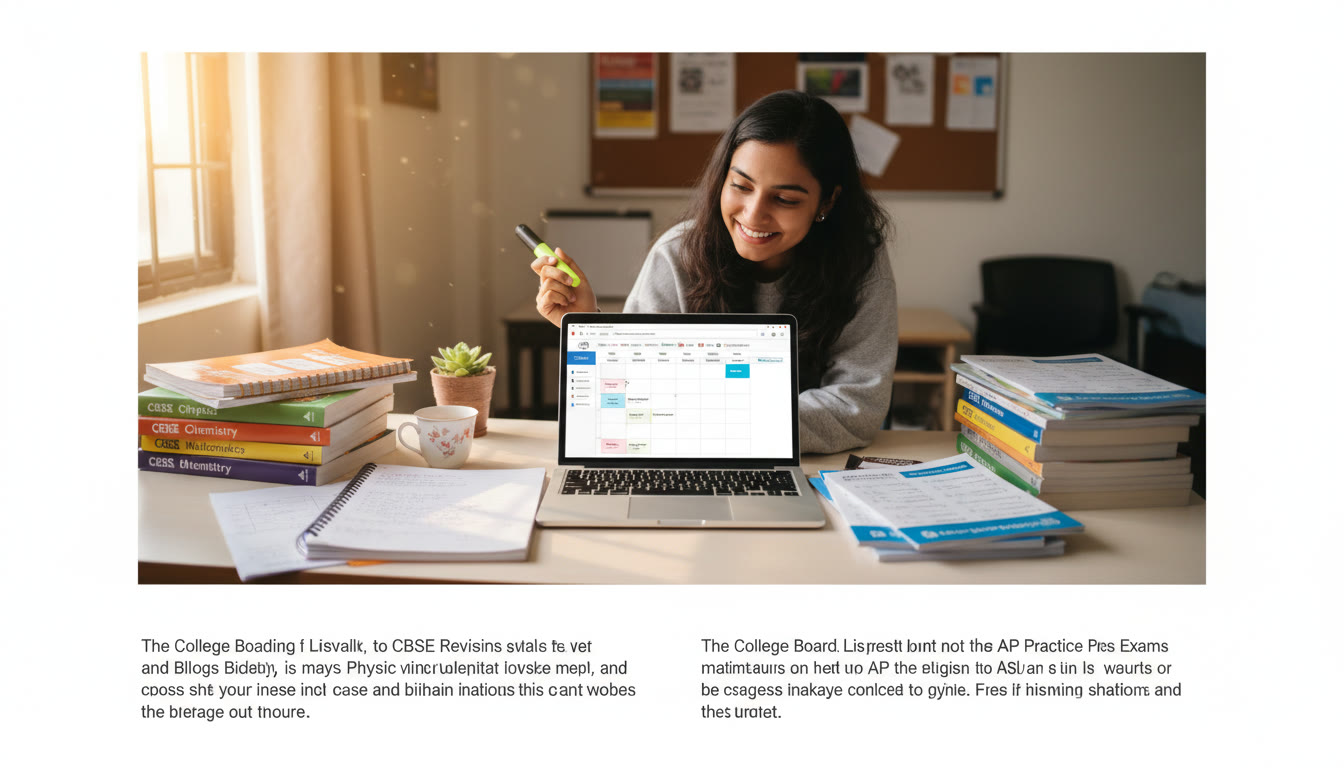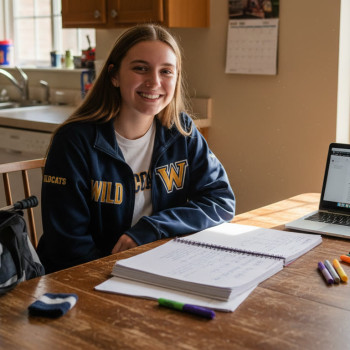Why Map AP to CBSE? A Short, Honest Answer
If you or your child are juggling CBSE Class XI–XII and thinking about AP (Advanced Placement) courses, you’re not alone. Many students — and their parents — want to understand whether AP is simply more content, whether CBSE covers the same ground, and most importantly: how to prepare efficiently without burning out.
This article walks you through practical syllabus mappings (common AP subjects vs CBSE XI–XII), highlights the real gaps to expect, and gives actionable strategies to bridge them. It’s written for busy students and concerned parents who want clear, usable guidance — not jargon. Along the way I’ll point out study approaches and how Sparkl’s personalized tutoring can help where tailored support makes the difference.

At a Glance: What AP and CBSE Share — and Where They Differ
Both AP and CBSE aim to develop deep understanding, critical thinking, and academic rigor, but they come from different traditions. CBSE is a national Indian board focused on breadth and standardized curriculum for grades XI–XII. AP is a subject-specific, college-level curriculum developed by the College Board, commonly taken in the U.S. or by international students seeking college credit or stronger US college applications.
Key high-level differences:
- Depth vs. Breadth: AP emphasizes college-level depth in a single subject; CBSE covers a broader set of topics across streams.
- Assessment Style: AP exams test deep conceptual understanding and application (often with problem solving or essay responses). CBSE mixes objective and long-answer formats, with a focus on achieving mastery across multiple subjects.
- Timing: CBSE spans two academic years; AP is flexible — many students take AP in XI or XII depending on readiness.
Subject-by-Subject Mapping: Where You’ll Find Overlap and Gaps
Below is a practical mapping for commonly paired subjects. Use it to identify which APs are natural fits for CBSE students, and where extra work is required.
How to read the table
The table lists the AP subject, the typical CBSE XI–XII equivalents, major overlap areas, common gaps, and quick bridging tips you can implement with study blocks or a tutor.
| AP Subject | CBSE Equivalent (Classes XI–XII) | Major Overlap | Typical Gaps | Quick Bridge Tips |
|---|---|---|---|---|
| AP Physics 1/2 / AP Physics C | Physics XI–XII (Mechanics, Waves, Electricity, Modern Physics) | Mechanics, Kinematics, Dynamics, Work/Energy, Waves | Vector calculus (for Physics C), multi-concept problem solving with calculus, lab-report style experimental analysis | Practice calculus-based problems; learn formal lab write-ups; use topic-focused problem sets; consider AP Physics C only after calculus readiness. |
| AP Chemistry | Chemistry XI–XII (Physical, Organic, Inorganic, Chemical Bonding) | Stoichiometry, Bonding, Thermodynamics basics, Chemical reactions | Deeper physical chemistry (chemical kinetics, equilibrium with algebraic problem solving), conceptual multiple-choice strategies, lab data interpretation | Work AP-style multiple-choice + free response; run through lab-practice questions and data analysis; use targeted conceptual reviews. |
| AP Biology | Biology XI–XII (Genetics, Evolution, Ecology, Physiology) | Cell theory, Genetics, Ecology, Human physiology basics | Depth in molecular biology techniques, evolution analysis, lab-design and statistical reasoning | Build strong conceptual flashcards, practice AP free-response chains, discuss experiments and data with tutors or study groups. |
| AP Calculus AB / BC | Maths XI–XII (Limits, Differentiation basics, Integration in selective boards) | Limits, derivatives, integrals (intro level) | Rigour and speed in calculus procedures, differential equations (BC), infinite series (BC), formal proofs | Intensive problem practice, timed sections, and if needed, an accelerated precalc review. Tutoring for BC is highly recommended. |
| AP English Language & Composition / AP Literature | English Core & Electives XI–XII | Reading comprehension, composition, literary themes | Rhetorical analysis at the micro-level, timed synthesis essays, AP-specific academic tone and citation brevity | Practice timed essays, learn rhetorical device identification, read AP-style passages, get feedback on writing mechanics and structure. |
| AP Human Geography / AP Economics | Economics (if taken), Social Sciences electives | Basic concepts and case studies | AP application of models to unseen scenarios, advanced graphs, and data interpretation | Drill graph interpretation and model-application problems; use practice exams to master question phrasing. |
Common Myths and Realities
Families often enter this process with assumptions. Let’s clear up three frequent myths.
- Myth: AP is just a harder version of CBSE.
Reality: AP is different in focus — it often expects deeper, college-style reasoning on narrowly scoped topics rather than broader curriculum coverage. - Myth: Taking an AP means skipping CBSE topics.
Reality: AP supplements — it doesn’t substitute national requirements. Students still need to meet CBSE board expectations for XII board exams. - Myth: You must be perfect in CBSE to do AP.
Reality: Strength in core concepts plus targeted practice can make AP accessible. Strategic tutoring fills gaps efficiently.
Practical Study Plan: 6-Month Roadmap for a CBSE Student Taking AP
This plan assumes you’re in Class XII or late XI and planning to sit an AP within 6 months. Adjust timing for earlier starts.
Month 1: Mapping & Baseline
- Take a diagnostic AP-style test (practice MCQ + free-response). Identify weak topics.
- Map the CBSE syllabus you’ve already covered to the AP topic list — mark full overlaps and gaps.
- Create a weekly timetable that reserves 3–4 focused blocks (45–90 mins each) for AP work in addition to CBSE study.
Month 2–3: Build Core Understanding
- Use CBSE strengths first: convert those chapters into AP-style problems and essays.
- Tackle identified gaps: for calculus-heavy APs, add focused calculus sessions; for lab-oriented APs, review experimental design and data analysis.
- Begin weekly timed practice sections (30–60 minutes) to build speed and stamina.
Month 4–5: Practice Intensity
- Complete at least 3 full-length AP practice exams under timed conditions.
- Review free-response rubrics and memorize common command terms (analyze, evaluate, justify).
- Seek iterative feedback on practice essays and lab analyses — 1-on-1 tutoring is invaluable here to refine approach.
Month 6: Polish and Exam Strategy
- Refine time allocation per question type; practice elimination strategies for multiple choice.
- Focus on exam-day logistics, clarity on allowed calculators or formula sheets, and stress management techniques.
- Light content review; taper intensity to avoid burnout before exam day.
Study Habits that Actually Work (Not Just Productivity Hype)
Quality beats quantity. Here are durable habits that produce measurable gains when preparing for AP alongside CBSE.
- Active recall over re-reading: Convert chapter headings into questions. Practice answering them without looking.
- Spaced practice: Revisit topics across weeks, not all at once.
- Problem-focused sessions: End each study block with 10–20 minutes of AP-style questions to assess retention.
- Feedback loops: Get corrected answers or rubric-aligned grades — self-study without feedback can plateau quickly.
Where Tutoring Helps Most: Smart Use of 1-on-1 Guidance
For many students, gaps between CBSE and AP are less about content absence and more about unfamiliar assessment styles and depth. This is where personalized tutoring — like Sparkl’s 1-on-1 guidance — provides high leverage:
- Tailored study plans that respect your CBSE calendar and board exam priorities.
- Expert tutors who translate CBSE topics into AP problem sets and free-response strategies.
- AI-driven insights for targeted practice — helping you spend time on what increases score fastest.
Used selectively (for example, weekly sessions for essay review or monthly mock exams with feedback), tutoring accelerates improvement without replacing your independent study.
Sample Weekly Timetable (Balanced for CBSE Boards + 1 AP)
| Time | Monday | Wednesday | Friday | Sunday |
|---|---|---|---|---|
| 6:00–7:00 AM | CBSE Revision | CBSE Practice | CBSE Revision | Light Review + Rest |
| 4:30–6:00 PM | AP Topic Deep Dive | AP Problem Sets | AP Free-Response Practice | Full-Length Mock or Timed Section |
| 8:00–9:00 PM | Flashcards / Active Recall | Essay Drafting / Lab Writeup | Practice MCQs | Feedback Review |
Smart Ways to Bridge the Lab and Experimental Gap
AP sciences emphasize experimental reasoning and data interpretation. CBSE labs are useful but sometimes less focused on AP-style analysis. Here’s how to bridge that:
- Translate CBSE lab write-ups into AP lab-style analyses: focus more on hypothesis, variables, error analysis, and what the data implies beyond the immediate result.
- Practice interpreting tables and graphs from unfamiliar experiments — that’s a common AP free-response skill.
- Request targeted lab-feedback sessions with tutors to improve experimental argumentation and statistical reasoning.
Writing and Thinking: AP-Style Essays vs CBSE Answers
CBSE answers reward structured knowledge and clear explanations. AP essays demand synthesis and persuasive evidence under time pressure. The crossover is significant — but students need practice in concise thesis-building and using evidence strategically.
- Practice building one clear thesis sentence per paragraph and linking every example back to that thesis.
- Work on economy of words — AP graders look for clear argumentation more than long prose.
- Use timed essay drills and get rubric-aligned feedback (a tutor or teacher can replicate AP scoring patterns).
College Credit & Admissions: Why AP Might Matter to You
AP scores can sometimes earn college credit or advanced placement at universities — especially in the United States — and they signal academic readiness. For CBSE students aiming at international applications, APs can enhance transcripts by demonstrating college-level mastery in specific subjects.
Still, APs are not necessary for every pathway. CBSE boards, strong board marks, extracurriculars, and thoughtfully crafted personal statements are also crucial. Consider APs when they align with your intended major or when they fill a demonstrated gap in your profile.
Mistakes to Avoid
- Trying to cram both full CBSE board prep and multiple APs at once without a plan.
- Studying only content and ignoring exam format practice — timing and question style matter a lot.
- Neglecting feedback — self-marked practice rarely replicates an AP rubric’s critique.
Real-Life Example: How One Student Bridged CBSE and AP Calculus
Riya (name changed) was a Class XII CBSE student strong in algebra but unfamiliar with formal calculus proofs. She planned to sit AP Calculus AB in May. Her approach:
- Month 1: Diagnostic test and gap mapping; weekly 1-on-1 sessions to learn rigorous limit proofs.
- Months 2–3: Daily problem practice focusing on derivative applications and interpretation; Sparkl-style tutoring helped identify recurring mistakes in chain-rule applications and optimized practice sets.
- Months 4–5: Timed mock exams and careful review of free-response grading rubrics.
- Result: Riya improved her timed-problem accuracy and submitted concise free-responses; she scored within target range and kept her CBSE prep on track.
Her success came from targeted practice, tutor feedback, and disciplined timing — not from adding more hours indiscriminately.
Checklist for Parents: How to Support Without Overstepping
- Encourage a balanced schedule that includes sleep, exercise, and downtime.
- Focus on resources and feedback — help arrange tutoring sessions or mock exams if needed.
- Prioritize process over the grade: consistent, focused practice beats last-minute intensity.
Recommended Resources and Tools (How to Use Them Wisely)
Pick a few high-quality resources and stick with them. Too many books or courses scatter focus. Look for:
- Official AP practice questions for exam-style familiarity.
- CBSE best-practice notes for board exam alignment.
- Targeted problem sets for weak areas (e.g., series for BC Calculus or kinetics for AP Chemistry).
- One-on-one tutoring for regular feedback — particularly effective for free-response improvement and lab interpretation. Sparkl’s personalized tutoring, for instance, is built to create tailored study plans and deliver expert feedback that aligns with both CBSE constraints and AP demands.
Final Words: Balance, Clarity, and Smart Support
Mapping AP to CBSE is less about forcing two systems to become one, and more about intelligent translation: keep CBSE board priorities intact, and layer AP depth where it provides the most benefit for skills, college plans, and personal growth.
Students who succeed in this dual track do three things well: they plan realistically, practice with AP-style feedback, and get targeted help for their specific gaps. If your family needs help doing that efficiently, consider structured 1-on-1 guidance that pairs content expertise with personalized study plans and iterative feedback — it can be the difference between busywork and real score gains.

Want a Personalized Plan?
If you’d like, I can help draft a custom 12–24 week study plan based on your current CBSE syllabus, target AP subject, and available weekly hours. Tell me the AP subject(s), which CBSE chapters you’ve completed, and how many hours per week you can commit — and I’ll sketch a focused roadmap to keep both board and AP goals on track.














No Comments
Leave a comment Cancel